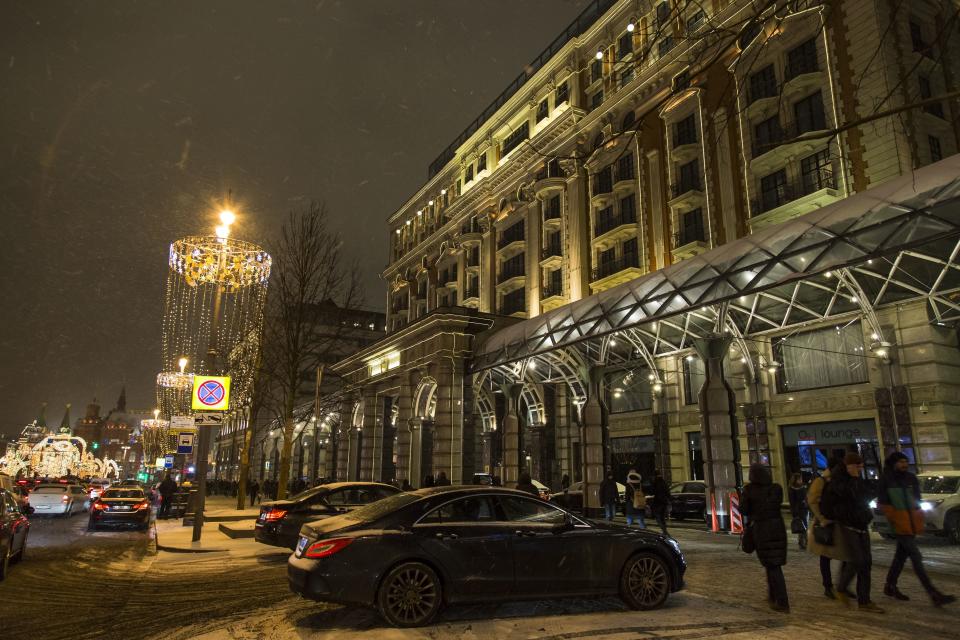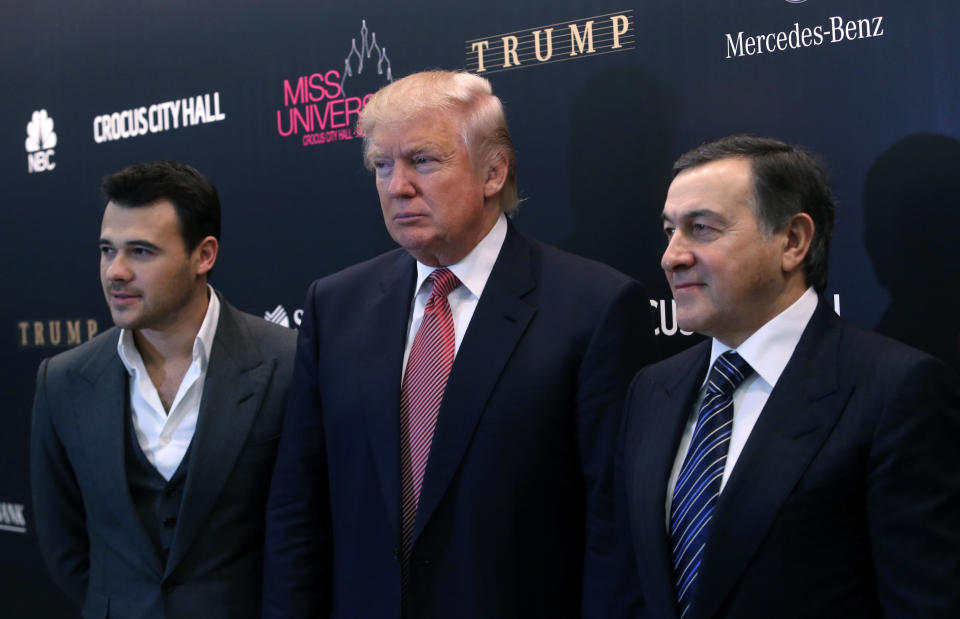'Country bumpkins': 5 business problems with Trump’s Russia project
To gain approval for a Moscow hotel project in 2015, the Trump Organization reportedly considered giving a lavish, $50 million penthouse to Russian president Vladimir Putin. That would supposedly clinch Putin’s approval for the deal, while drawing other rich tenants who would want to live in Putin’s orbit.
It might make a decent plot device in a movie. But people familiar with the business climate in Moscow deride the idea of blatantly bribing Putin as amateur armchair dealmaking. “You don’t need Vladimir Putin’s approval to open a hotel in Moscow,” says Scott Antel, an international real-estate lawyer who’s been involved with about 50 hotel projects in Moscow. “Never in my career have I needed the godfather’s approval. This is just embellishment.”
Donald Trump’s efforts to build a residential and commercial complex in Moscow have become a central focus of various investigations into his business dealings in Russia and possible compromising connections with Russian operatives. During Congressional testimony on Feb. 27, Trump’s former lawyer, Michael Cohen, said, “Mr. Trump knew of and directed the Trump-Moscow negotiations throughout the campaign and lied about it.”
Cohen originally told Congress Trump’s interest in a Moscow deal ended in January 2016, before the Republican primary elections began. But Cohen now says negotiations on a Moscow deal continued through at least June 2016, when Trump was poised to accept the Republican presidential nomination. Cohen later pleaded guilty to lying to Congress, one of several crimes for which he will spend roughly three years in prison, starting in May. Cohen also says two of Trump’s attorneys knew he’d be lying to Congress, a charge they deny.

Trump’s desire to strike a lucrative deal in Moscow might explain the strange affinity he has expressed for Putin, along with a forgiving attitude toward Russia’s meddling in the 2016 U.S. election. Yet there are obvious holes in the tale of Trump’s never-consummated Moscow deal, which suggest Trump may have lacked the wherewithal to do a deal, or may not have been all that serious about it.
“It sounds like country bumpkins bumbling around,” says an American businessperson with years of experience in Russia. “It’s one of the most ludicrous things I’ve ever heard.”
Trump himself hasn’t detailed his recent business interests in Russia. The public narrative on the matter comes from Cohen’s testimony, snippets of legal filings, leaks to the press and comments from Trump family members years before Trump ran for president. Here are five problems with the story as we know it so far:
Pursuing Putin
Western media tends to portray Putin as an omniscient puppet master who takes a cut of every business deal in Russia. Yet while Putin has certainly earned billions through graft and payoffs, neither he nor his notorious oligarch pals dominate the business climate in Moscow. “Putin getting a cut of a hotel in Moscow is utter nonsense,” says another American businessperson who has operated in Moscow. “A $200 million tower in Moscow would be so far beneath Putin’s radar. He’s running Russia. How could he possibly be concerned about a residential tower?”
Westerners who have done business in Moscow describe it as a cosmopolitan city not too different from New York or Chicago. Moscow Mayor Sergey Sobyanin and other city officials pull most of the strings, with the federal government intervening only in unusual circumstances.
“Believe it or not, doing business in Moscow is not difficult,” says lawyer Jamison Firestone, the former partner of Russian lawyer Sergei Magnitsky, who died in a Russian prison in 2009 after nearly a year of detention and torture. “Very few western companies would do the whole thing themselves. Usually they get a Russian partner.” Bribes may be required for complex deals or special permissions, and it’s much harder to buy land and build new property than to lease land and develop a property that already exists. Still, many international hotel brands, including Marriott, Hyatt, the Ritz-Carlton and the Four Seasons, have long operated in Moscow.

In October of 2015, the Trump Organization signed a “letter of intent” with a Russian firm called IC Expert Investment Co. to partner on a Moscow project. Yet three months later, Cohen sent an unsolicited email to the public email address for Putin’s press secretary, Dmitri Peskov, seeking help with the project. A Russian official phoned Cohen and invited him to an economic development conference later that year. “We told them that the Presidential Administration doesn’t build houses,” Peskov recounted in 2018. It’s not clear if Cohen reached out to Peskov because the Russian partner wasn’t getting the job done, or for some other reason, such as the possible prestige of a Putin connection. But as a business ploy, it was unnecessary and misdirected.
The ‘absurd’ Putin bribe
A Trump associate named Felix Sater first told Buzzfeed last November of the plan he and Cohen pursued to give a penthouse to Putin back in 2016. Sater is a controversial Russian-born dealmaker who has been involved with other Trump properties, and apparently positioned himself as somebody who could wrangle Putin’s support for a Trump deal in Moscow. Yet his approach makes no sense to people with experience in Moscow real estate. “You’re offering a penthouse to a guy who has access to anything he wants,” says one of the American businesspeople. “Among real-estate pros in Moscow, this is just absurdity.”
Even if Putin were interested in a such a bribe, he would never set foot in a normal residential property. “The chance of Vladimir Putin actually living in that penthouse would be zero, with the kind of security he needs,” says Firestone. “This is a guy who brings his own food with him when he travels and lives in a guarded compound. This is a guy who doesn’t have neighbors.”
Trump’s onerous terms
The 2015 letter of intent signed by Trump and IC Expert Investment says Trump will receive a $4 million upfront licensing fee, a percentage of gross sales ranging from 1% to 5%, and 3% of “other” revenue. Those may have been opening bids—similar, perhaps, to the terms Trump got on other deals—but they were unrealistic for the market in Moscow. “That’s completely abnormal,” says real-estate lawyer Scott Antel. “Nobody would pay $4 million upfront.” More typical, he says: An initial “design” fee of $100,000 to $300,000, plus 2% to 3% of gross revenue.
The lousy Russian economy
“Russia is one of the hottest places in the world for investment,” Trump said in 2007. It may still have been that way when Trump traveled to Moscow in November of 2013 for the Miss Universe pageant, which he co-owned. By 2015, however, Russia was far colder.
The United States and other western nations imposed tough sanctions on Russia following its annexation of Crimea and invasion of Ukraine in 2014. Russia earned further global animosity when a Russian missile fired from Ukraine shot down a Malaysian airliner on July 17, 2014, killing 298 passengers and crew. Oil prices plunged the same year, further hurting Russian’s energy-dependent economy. The ruble tanked, GDP contracted and foreign travel to Russia dried up. By the time Trump signed the letter of intent in 2015, the business case for opening a property in Russia may have been doubtful, if not terrible.

The climate for foreigners operating in Russia might be even worse now. In mid-February, Moscow authorities arrested American financier Michael Calvey, whose investing firm, Baring Vostok Capital Partners, owns part of a Russian bank. Other bank shareholders accuse Calvey of fraud. Calvey says the dispute is a civil matter, not a criminal one. Yet Russian courts have refused to release him. Critics of the Russian government say the arrest seems arbitrary—perpetrated, perhaps, by politically powerful rivals of Calvey—and will further chill foreign investment in Russia.
Trump’s limited interest
Before Congress on Feb. 27, Cohen testified, “There were at least a half-dozen times between the Iowa Caucus in January 2016 and the end of June when [Trump] would ask me ‘How’s it going in Russia?’” Cohen made it sound like Trump was deeply interested in the deal—but half a dozen times in six months is only one inquiry per month. Cohen said he provided other briefings for Trump’s children, who were helping run the business at the time. But still, one monthly check-in from the man in charge does not reveal a high-priority project getting ample resources. If anything, it sounds like a side project Cohen might have been dabbling in. Anybody who’s ever been part of a serious project knows the bosses monitor it relentlessly and even micromanage on a daily basis. They don’t just check in sporadically.
Trump might still have been serious about a Moscow project, despite these red flags. One thing he has said is that he kept the project going because he wasn’t sure he’d win the 2016 election. In the fall of 2015, in fact—when Trump signed the letter of intent—he was considered a long-shot to even win the Republican nomination. So it’s plausible Trump kept the project idling, thinking he’d focus more intently once the election was over. Prosecutors—including special counsel Robert Mueller—are likely to know more than the public does, and may enlighten us eventually. For now, Trump’s Russia venture remains a tantalizing, if confusing, unfinished tale.
Confidential tip line: [email protected]. Click here to get Rick’s stories by email.
Read more:
4 problems for Trump in Michael Cohen’s testimony
Why voters will reject the "Green New Deal"
Voters are souring on “Medicare for all”
Amazon and the brewing war on corporate America
Trump’s attacks on “socialist” Democrats might just work
3 problems with Elizabeth Warren’s wealth tax
Rick Newman is the author of four books, including “Rebounders: How Winners Pivot from Setback to Success.” Follow him on Twitter: @rickjnewman
